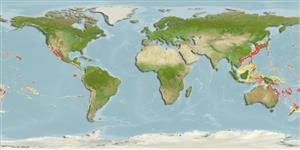Classification / Names
आम नाम | उपशब्द | Catalog of Fishes(वर्ग, प्रजाति) | ITIS | CoL | WoRMS | Cloffa
Environment: milieu / climate zone / depth range / distribution range
पारिस्थितिकी
समुद्री ड़िमरसल; गहराई सीमा 85 - 510 m (Ref. 58302). Tropical
Western Pacific: confirmed to occur from Japan, Korea and the East China Sea south
to Taiwan.
आकार / वज़न / Age
Maturity: Lm ? range ? - ? cm
Max length : 22.3 cm SL पुल्लिंग / अलिंग; (Ref. 7434); common length : 15.0 cm TL पुल्लिंग / अलिंग; (Ref. 9137)
पृष्ठीय सौफट रेज़ (सम्पूर्ण) : 15 - 16; ऐनल सौफट रेज़: 9 - 10; जानवरों की रीड़ का जोड़: 41 - 43. This species is distinguished by the following characters: D 16, rarely 15; A 10, rarely 9; pectoral fin rays 11, rarely 12; vertebrae41-43; total gill rakers 20 or 21, rarely 19 or 22; lateral line scales 42-43, rarely 41; pyloric caeca 11; in males, dorsal fin is large anteriorly, the membranes deeply incised but none of the rays are filamentous, third or fourth rays longest, reaching 25.7% SL, decreasing in length to middle of fin with posterior rays progressively longer, reaching 19.5% SL, its posterior lobe reaching to or past adipose �n origin; in females, anterior end o fin lower, with membranes deeply incised and rays decreasing in length to middle of fin, lengths of subsequent rays subequal, posterior lobe reaching little more than half way to adipose fin; anal fin in males is relatively deep with posterior lobe approaching hypural crease in large individuals, smaller in females with posterior lobe reaching little more than half way to hypural crease; Males have prominent, large orange to red blotch or markings anteriorly and yellow spots posteriorly in dorsal fin, 3 broad bands on side with wide dark brown margins dorsally, wide yellow stripes on each lobe of caudal fin and white pelvic and anal fins the pelvic somewhat orange basally and anal with broad yellow stripe on basal half; females have orange to red spots scattered on dorsal fin, similar but less defined pattern on side, caudal fine with mottled yellow to orange pattern, similar pelvic fin but no yellow on anal fin (Ref. 94775j).
Found in sandy or muddle areas (Ref. 9137). Benthic (Ref. 58302). Can also be found at 30 m depths (Ref. 11230). A carnivore which feeds on fish and crabs (Ref. 9137).
Life cycle and mating behavior
Maturities | पुनरुत्पत्ति | Spawnings | Egg(s) | Fecundities | लार्वा
Randall, J.E. and K.K.P. Lim (eds.), 2000. A checklist of the fishes of the South China Sea. Raffles Bull. Zool. Suppl. (8):569-667. (Ref. 36648)
IUCN Red List Status (Ref. 130435)
Threat to humans
Harmless
Human uses
मात्स्यिकी: व्यापारिक
साधन
Special reports
Download XML
इंटरनेट स्रोत
Estimates based on models
Preferred temperature (Ref.
123201): 5.7 - 21.3, mean 15.2 °C (based on 146 cells).
Phylogenetic diversity index (Ref.
82804): PD
50 = 0.5020 [Uniqueness, from 0.5 = low to 2.0 = high].
Bayesian length-weight: a=0.00447 (0.00187 - 0.01067), b=3.12 (2.91 - 3.33), in cm total length, based on LWR estimates for this (Sub)family-body shape (Ref.
93245).
Trophic level (Ref.
69278): 4.0 ±0.66 se; based on food items.
लौटाव (Ref.
120179): माध्यम, न्यूनतम जनसंख्या दुगनी होने का समय 1.4 - 4.4 वर्ष। (Assuming tm=1-3).
Fishing Vulnerability (Ref.
59153): Low vulnerability (17 of 100).
